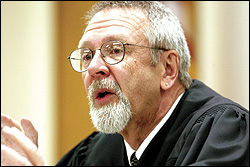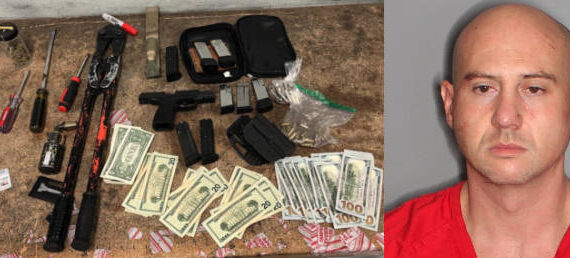Just what did Chelan County Superior Court Judge John E. Bridges decide on Friday, Feb. 4? After the second day of pretrial hearings on Republican Dino Rossi’s challenge of Democratic Gov. Christine Gregoire’s 129-vote election win, both sides claimed unambiguous victory. There’s no doubt that the Democrats lost their motions on where the trial should be held: Bridges said his courtroom was the proper venue, not the state Legislature, as the D’s contend. There’s also no ambiguity about the fact that Bridges declared that he cannot give the Republicans what they want the most: a “revote” or a special election for governor this spring. But when it comes to the judge’s statements on how the upcoming trial will be conducted and what he can ultimately do if he finds the governor’s election was illegal, the two sides remain as far apart as imaginable.
Surprisingly, the Democrats sounded genuinely delighted after last Friday’s hearing, even though they lost three of their four motions before the court. Democratic Party attorney Kevin Hamilton, of the Perkins, Coie law firm, explains that Bridges’ ruling on how the trial will proceed means Rossi must show that at least 130 votes—enough to alter the outcome—were cast illegally for Gregoire. “How do they go about proving that?” asks Hamilton rhetorically.
Theoretically, Rossi could produce 130 Gregoire voters who voted illegally and will swear to that on the witness stand, but Rossi’s camp has no intention of doing that. For weeks, Rossi’s attorneys have argued that all they need to show in order to have the election tossed is that there were at least an equal number of illegal votes cast as the 129-vote difference between the two candidates—something they can more easily demonstrate. On Friday, Bridges seemed to set the bar considerably higher.
Near the end of the hearing, Bridges delivered a lengthy recitation on the standards for how the case would be decided and then took a break. When he returned to the bench, he attempted to clarify his remarks. “The standards are in [RCW 29A.68].070—so you have some idea of what the standards are for the proof the petitioners have to satisfy,” he said.
RCW 29A.68.070 says that in order to boot an elected official out of office, you have to show the person was “duly elected although the person did not receive the highest number of votes.”
Republican Party lawyer Diane Tebelius says the judge’s remarks didn’t change anything: Rossi only needs to show there were 130 illegal votes, not 130 illegal votes for Gregoire. “We have those illegal votes. The election is in question,” she says.
The other main disagreement between the two parties concerns the remedy the judge can provide to Rossi. On Friday, Bridges clearly stated what he cannot do: “The court concludes that a statewide special election is not permitted.” Both sides also agree that Bridges can install Rossi as governor if the judge finds the Republican won the election. Democrats say that is the only thing the judge says he can do. Republicans said that Bridges also left open the possibility of declaring the election null and void and vacating the office of governor. Neither side can point to a simple declarative sentence, however, where the judge stated their position unequivocally.
Under everyone’s reading of the state constitution, if the office of governor is vacated—whether through legal action or death—the lieutenant governor takes over. In this case that means Lt. Gov. Brad Owen, a conservative, rock-and-roll-guitar-playing, anti-drug-preaching Democrat, would assume office.
What happens after that will likely be the subject of more legal arguments. If the judge’s ruling comes six weeks before the state’s primary election this year, assistant attorney general Jeff Even says a new election for governor could be held in November. Such an election would not be limited to a “revote” between Rossi and Gregoire, however. Indeed, all qualified candidates, including the incumbent Owen, could register and there would be a new primary to winnow the field down to two. Even acknowledges, however, that there will be some who argue a new election for governor cannot occur until November 2006 due to ambiguities in state law and previous Washington State Supreme Court rulings.
Who is correctly interpreting—or spinning—the judge’s oral rulings? Democratic lawyer Jenny Durkan says we’ll know a lot more in a couple of weeks when the judge signs his orders on the motions that have come before him—essentially writing down his rulings from the bench. At that point, we’ll know whether Owen should be rehearsing to play his Stratocaster to a larger audience.








